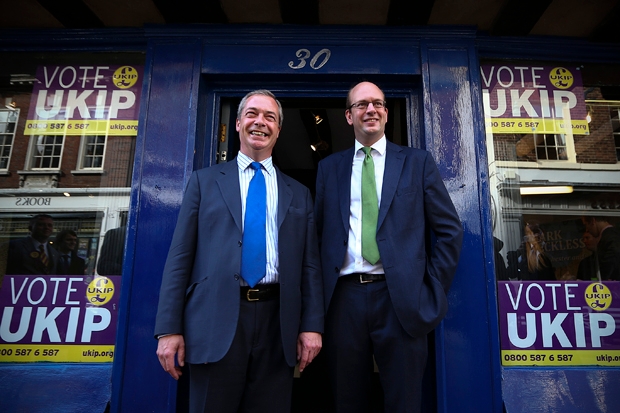In the 2005 general election this magazine supported the Conservatives, with one exception — we urged voters in Medway not to vote for a deeply unimpressive Tory candidate by the name of Mark Reckless. Our then political editor, Peter Oborne, went so far as to write a pamphlet in support of the Labour rival, Bob Marshall Andrews, who had a commendable record of sticking it to Tony Blair. Reckless, by contrast, had nothing to commend him. He lost by just 213 votes — suggesting that The Spectator’s intervention had been decisive.
But nothing, it seems, will prevent Reckless from being elected as Ukip’s second MP in two weeks’ time. The Ukip momentum in Rochester & Strood now looks unstoppable. The European Union is giving Ukip plenty of help, presenting Britain with a £1.7 billion bill in punishment for having the fastest-growing economy in the continent. In protesting so loudly against this, David Cameron makes Nigel Farage’s point very clearly: Britain is trapped in an unfair system.
It is strange to think that only a few weeks ago, the Tories were confident about keeping hold of Rochester & Strood. They had been blindsided by Douglas Carswell’s defection to Ukip, and unable to organise themselves in time to hold Clacton; in any case, his constituency was ideal territory for Ukip. Rochester, they thought, was different. Mark Reckless’s is a Tory safe seat, and he has none of Carswell’s eloquence or popularity. Most Conservatives were reluctant to campaign too hard against Carswell, but many were keen to crush Reckless — and, hopefully, mark the beginning of the end of Nigel Farage.
But to the great surprise of No. 10, it turns out that voters in Rochester are not very interested in joining the Tory fightback. Even Cabinet members are returning from Rochester with the sense that the battle is already lost. So the talk has turned to damage limitation: how to ensure that the Prime Minister is not too closely associated with failure, given that he already made five visits to the constituency? How to pretend, the day after the election, that losing two by-elections to Ukip doesn’t really matter?
There is another question that the Tory high command should be asking itself: how did it come to this? And why, six months away from a general election, are they still unable to compute or combat the potency of the Ukip threat?
Some time ago, Cameron dismissed Nigel Farage’s supporters as ‘fruitcakes, loonies and closet racists’ — a slur he later retracted. But the overall idea persisted within the inner circles of government that Ukip’s voters were not the type that a modern Conservative party should be interested in. As Ukip’s popularity grew, so did this line of argument: who really wants to champion decaying seaside resorts like Clacton?
Only last month, a senior Tory strategist was listing the characteristics of Ukip voters: older people, who left school aged 15, who apparently agree with the statement ‘I hardly recognise the country I’m living in any more.’ The Conservatives should listen to such voters, he said, even respect them. But their demands should not be heeded. They represent the past; the modern Tories should be interested in the future.
The great irony is that the Tory modern-isers have failed to understand modern Britain. Globalisation does indeed produce winners and losers, but both are modern phenomena. It is true that Ukip is supported by people who believe the system is not working out for them, but such people are not the effluent of the 20th century or stuck in the past. They have legitimate concerns. They should be seen as the most important voters in the 21st, the ones most in need of conservative solutions. A One Nation Conservative party should be for everyone, not just those with fashionable opinions.
So far, everything Cameron has done to attack Ukip seems to have made it stronger. His welcome pledge to hold an in-or-out referendum on EU membership did nothing to drain Ukip support. His promise to announce (before Christmas) a way to limit the number of EU migrants to Britain was seen as just another sign of panic — and rightly so. He has no means of fulfilling this promise. His angry press conference last -Friday, when he declared that he won’t pay the EU bill, will simply make him look foolish when he does pay.
The way to fight Ukip is not to try to copy its policies or imitate its anger. Voters can see through that charade. David Cameron must respond by exuding a sense of purpose and direction. He should start by reminding people of how much the party has to offer Ukip voters. If the elderly in Clacton are concerned about the future, they should be reassured by the (very expensive) triple lock which George Osborne has promised to place on the value of pensions. The old and sick should know that the Tories have made a (very expensive) pledge not to cut the NHS budget. And those concerned about Europe have only one logical choice at the next election: to vote Tory and secure a referendum.
So the Tories already have the policies — but these proposals need to be sold properly, by a party that is led properly. Even now, it’s not too late for that.






Comments